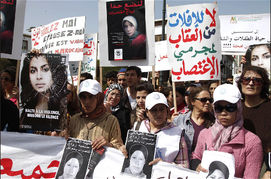Violence Against Women
Source: Magharebia
Everyone in Morocco remembers Amina al-Filali, the Tangier teenager who drank rat poison after being forced to marry her rapist.
Nearly two years after the suicide of the 16-year-old, the Moroccan parliament on Wednesday (January 22nd) finally scrapped the controversial law that enabled rapists to escape punishment.
Under Moroccan law, rape is punishable by several years in prison if the victim is a minor. Marriage to the victim, however, shielded the perpetrator from prosecution.
That was before parliamentarians unanimously adopted the amendment to Article 475 of the penal code. Perpetrators will now face prison sentences of up to 5 years and a fine.
"Those who are found guilty of corrupting a minor now have no escape and must answer to the courts for their actions," Justice Minister Mustapha Ramid said last Thursday.
Amina's death in March 2012 unleashed a nationwide debate on the need for legal reforms and attitudinal changes. Human rights activists campaigned to demand the law's repeal or revision, under the title: "We are all Amina al-Filali".
The old legal provision infringed human rights and absolutely had to be repealed, MP Rachida Tahiri agreed.
"It took 16-year-old Amina Filali's suicide and nearly two years for the parliament to close the loophole that allowed rapists to avoid accountability. It's time to have laws that protect survivors of sexual abuse," commented Hassiba Hadj Sahraoui, the deputy director of Amnesty International's Middle East and North Africa programme.
"This vote is a positive step, but Morocco still needs to implement a comprehensive strategy to protect women and girls from violence with the help of women's rights groups, which have been excluded from the process thus far," she added.
In amending the law, Morocco is shouldering its international human rights commitment by amending the law, Chamber of Representatives Legislation Committee chief Abdellatif Ouahbi noted.
"No rapist or attacker should be able to escape punishment," he said.
Many members of the public have welcomed the move. Safae Nourali, a teacher, said that the old law brought shame to Morocco.
"Instead of incriminating rapists, the law rewarded them by allowing them to marry their victims. A huge absurdity has now been brought to an end," she said.
Sara Mrabti recounted the story of her 16-year-old neighbour Zahra. Like Amina, she was forced to marry her rapist.
"She went through an ordeal that lasted for three months until her so-called husband decided to divorce her," Mrabti told Magharebia.
"It was her father who agreed to the option of marriage in order to escape the scornful looks of his community," she said.
Zahra is now undergoing therapy with a psychologist but has not yet returned to her studies, Mrabti said.
"The new law will help limit the number of rape cases because the perpetrators will no longer have a way out," she added.
